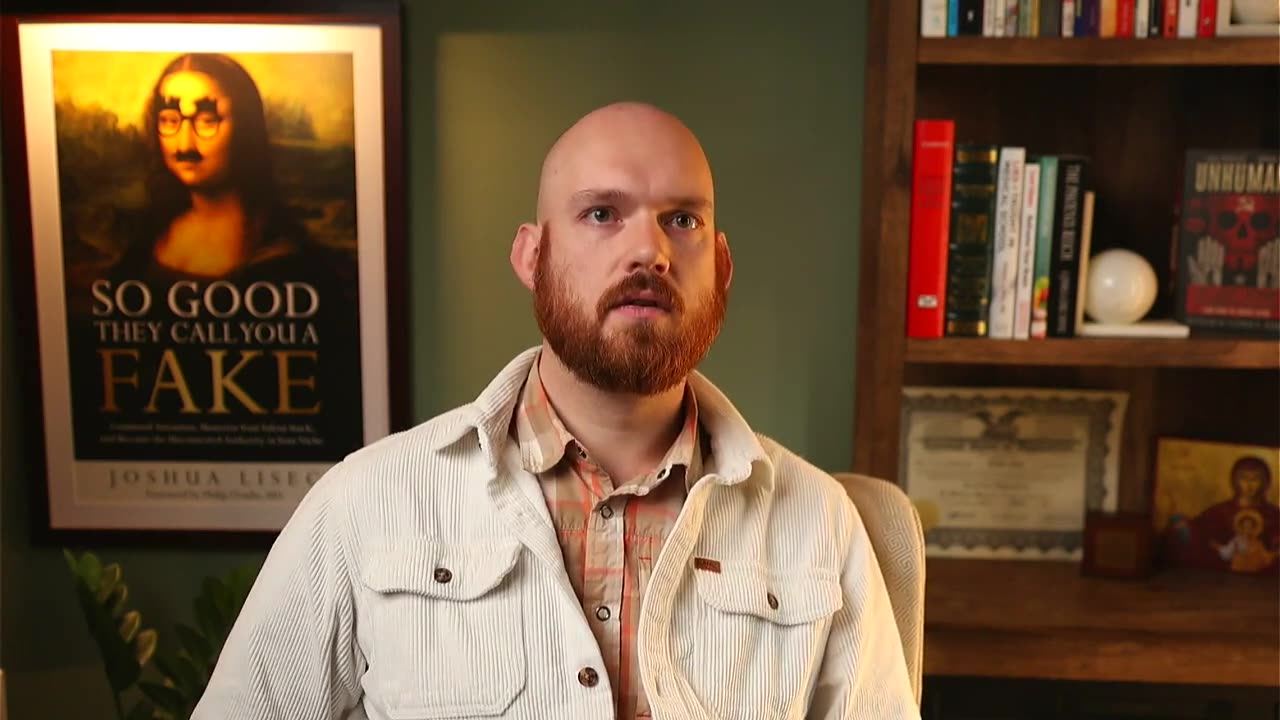Premium Only Content

What Are "Thought Terminating Cliches"? ft. Ukraine News — Daily Persuasion with Joshua Lisec Ep 184
Would you like to write a persuasive BOOK? One that changes minds and influencers behavior for years to come? Start with a GOLDEN book idea. Let NEW YORK TIMES bestselling author Joshua Lisec teach you: https://lisecghostwriting.com/golden
ABOUT TODAY'S EPISODE:
Why do certain political phrases shut down thinking instead of starting a conversation?
In Episode 184 of Daily Persuasion, titled “What Are ‘Thought Terminating Clichés’? ft. Ukraine News”, Joshua Lisec dives deep into the manipulative language tactics that dominate modern discourse—from “defend democracy” to “protect trans kids”—and explains exactly why they are so dangerously effective.
These aren't just catchy slogans. They are thought-terminating clichés. And as Lisec explains, understanding how they work is critical if you want to master persuasion—especially when trying to influence those caught up in the propaganda loop of mainstream narratives.
In this episode of Daily Persuasion, Lisec—New York Times bestselling author, ghostwriter of 90+ books, and certified hypnotist—uses the latest Ukraine news, including the viral Trump-Vance-Zelensky moment, as a backdrop to explain what thought-terminating clichés are, how they manipulate the mind, and why they’ve become the default language of political media on both the left and right.
“Our democracy. Protect trans kids. Women’s rights. These are not arguments—they are ends of thought,” says Lisec.
That’s what makes this episode essential. It’s not just commentary on Ukraine meetings, Trump-Zelensky interactions, or the Zelensky-Vance buzz online. It’s an advanced seminar in persuasion psychology, especially useful if you’re wondering how to persuade someone to do something without resorting to manipulation or cliché.
Lisec also revisits the definition of thought-terminating clichés, tracing it back to R.J. Lifton’s 1961 book Thought Reform and the Psychology of Totalism. These phrases were used by the Chinese Communist Party to silence dissent and justify atrocities—yet eerily, similar slogans are now echoed in American politics. That’s where the Ukraine news connection comes in: the use of moral slogans like “support Ukraine” has become shorthand for loyalty, not critical thought.
In between breakdowns of Trump Zelensky meeting coverage and critique of Vance Zelensky commentary, Lisec pulls apart how these slogans sideline actual conversation. He connects this language to Facebook Americans—those who curate their worldview via social media consensus—and to NPR Americans, who mistake calm voices for credible facts.
These personas are critical to understand because, as Lisec says, “You cannot persuade people if you don’t understand how they think.” Whether you’re dealing with liberals who operate in an ideological echo chamber, or conservatives too afraid to post their own opinions, you need tools—not just opinions.
That's where persuasive techniques and examples of persuasion in advertising come in. This episode teaches viewers techniques of persuasion in writing and in conversation, showing how anchoring, analogy, and emotional framing shape belief.
Lisec also reveals how phrases like “Land reform” and “Peace, land, bread” were used in 20th-century Communist propaganda—and draws eerie parallels to today’s buzzwords like “Save our democracy” or “Ban hate speech”. These aren’t persuasive tools; they are control tools. Knowing this helps you fight back—not by being louder, but by being smarter.
If you're in a business, leadership, or content-creation role, this episode is a must-watch. You’ll walk away with a better grasp of how to persuade someone to do something without falling into the trap of clichés. And if you're writing for impact? This is a crash course in techniques of persuasion in writing that actually move people.
Watch Daily Persuasion with Joshua Lisec Ep. 184: “What Are ‘Thought Terminating Clichés’? ft. Ukraine News” now.
🧠 Learn why phrases like “Trump-Zelensky meeting” and “Ukraine democracy” are often used to suppress thought.
🧰 Equip yourself with real persuasion techniques—not platitudes.
🎯 Understand persuasion psychology through historical context, including Ukraine news and CCP propaganda.
This is more than a commentary—it’s your daily persuasion workout with Joshua Lisec.
-
 2:36
2:36
Daily Persuasion with Joshua Lisec
10 days agoMultisensory Persuasion Demonstration — Daily Persuasion with Joshua Lisec Ep. 305
231 -

BonginoReport
2 hours agoFeds Monitor Threats Ahead of Kirk Memorial - Nightly Scroll w/ Hayley Caronia (Ep.138)
42.7K43 -
 LIVE
LIVE
Candace Show Podcast
1 hour agoWho Moved The Camera Right Above Charlie's Head? | Candace Ep 239
8,741 watching -
 LIVE
LIVE
The Mike Schwartz Show
4 hours agoTHE MIKE SCHWARTZ SHOW Evening Edition 09-19-2025
4,341 watching -
 21:49
21:49
Jasmin Laine
4 hours agoCBC Panel TURNS on Liberals—"Carney DOESN'T Know What He’s Doing"!
42611 -
 LIVE
LIVE
Mally_Mouse
2 days agoFriend Friday!! 🎉 - Let's Play! - 🎂 ITS MY BIRTHDAY!!🎂
67 watching -
 LIVE
LIVE
Quite Frankly
4 hours agoFriday Night News & Reviews | Sal The Butcher, Cultivate Elevate 9/19/25
342 watching -
 1:28:50
1:28:50
Kim Iversen
3 hours agoThe GOP's Biggest Fear: President AOC?!
89.5K84 -
 1:36:13
1:36:13
Roseanne Barr
4 hours agoCalling Out the Right’s Vultures with Katie Hopkins | The Roseanne Barr Podcast #116
112K62 -
 LIVE
LIVE
Nerdrotic
5 hours ago $6.34 earnedKimmel MELTDOWN | Hollywood Boycotts Disney | Friday Night Tights 372 with Kaida
1,717 watching